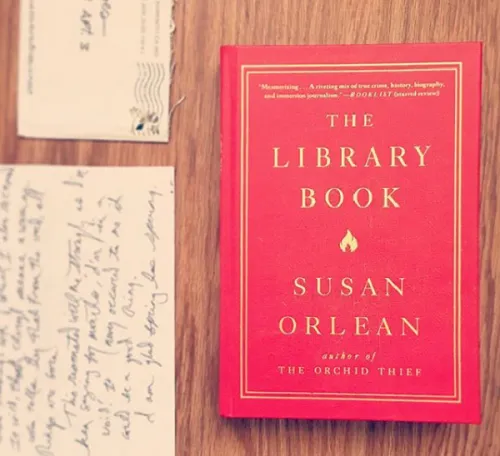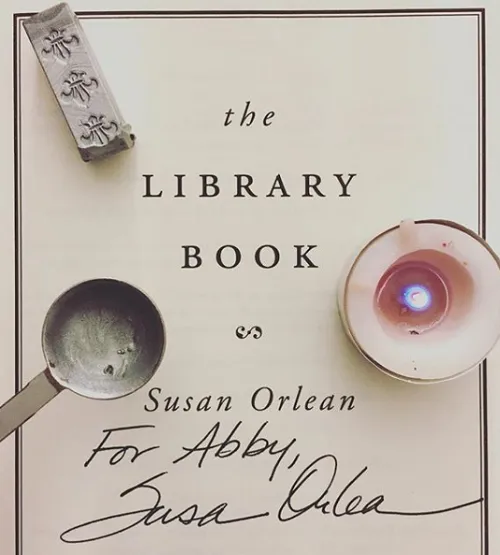
9 Things About THE LIBRARY BOOK and Susan Orlean
This content contains affiliate links. When you buy through these links, we may earn an affiliate commission.
Around 3:00pm on April 22, I headed to the central branch of my local library for a 7:00pm event. The doors were scheduled to open at 5:30pm. The event had already been scheduled and canceled once due to weather and the interest was huge—so I knew I had to save myself plenty of time to be sure I could get a seat. (And preferably one at the front, given that I’m only 5’0” and can’t see over others so well.) What was this event? Susan Orlean. The author of The Library Book was coming to speak about it in conversation with the director of the library system. So I packed a dinner in my space cat lunch box, grabbed my laptop and some books, and stowed my lap desk in my car. If I was going to wait four hours, I might as well keep busy.
The wait was well worth it. I learned more than I expected to at the event and even asked a question of my own about being a first-timer writing long-form fiction. In the spirit of libraries and sharing, I wanted to make what I learned available to the many who couldn’t attend. And so—here are nine things I learned at “Susan Orlean in Conversation with Library Director Diane Kresh” at Arlington Public Library.



Susan Orlean Is Stylish as Hell
I generally don’t notice too much about clothing and make a point to not notice women’s clothing in particular. But I have to say, Susan Orlean can wear an outfit. To this event, she wore a black, high-necked, short-sleeve top; a black skirt with alternating panels of electric blue and a sort of forest print; knee-high black boots; a fresh and youthful makeup look that perfectly matched her energetic and engaging demeanor; and her natural red hair down with a chunk of sea green coming from the back, underside portion. Honestly, I wanted her to come home with me and dress me.She Was Really Hesitant to Write The Library Book
In the text of the book, Orlean admits she was hesitant to write it, noting that friends don’t let friends write books (which she reiterated during the talk). However, this was a recurring discussion she had with herself. When talking about the emotional connection we have with and the magic of libraries after visiting an L.A. Public Library branch with her son for a school project involving interviewing a city worker (he picked librarian), she thought, “Someone should write a book about this. Not me. But somebody.” This happened multiple times before she finally gave in and, thanks to a chance event during a tour of Central involving the whiff of a book, went home to dive directly into her research.The Book Took Nearly as Long as the Library Rebuild
When the L.A. Public Library’s Central branch burned in 1986, no one could have guessed it would take seven years to get it back on its feet. This, however, was indeed the case. While the renovation took about seven-and-a-half years to be completed, Orlean spent six-and-a-half writing the book. And it shows, with minute details throughout that pay tribute not only to the library itself, but to its workers, its users, and library lovers around the world.Orlean Originally Thought She’d Play Detective
A journalist, Orlean is no stranger to getting to the truth of the matter. Also the author of The Orchid Thief, Orlean approached the story of The Library Book thinking she would get to the bottom of the fire—was it Harry Peak who set it aflame? Was it arson at all? She soon discovered, however, that arson is notoriously difficult to pin on an individual, let alone name as the sure cause of a fire. Read the book to find out whether she was successful nonetheless.










